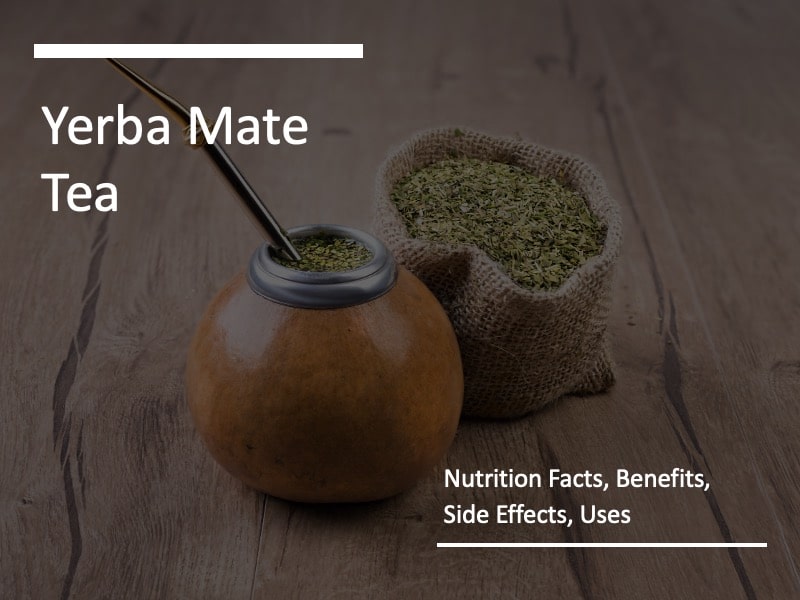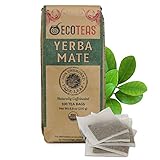Yerba Mate Tea: Nutrition Facts, Benefits, Side Effects, Uses
Yerba mate is a powerful tea that blends the energizing effects of caffeine with an impressive nutritional profile rich in antioxidants, polyphenols, and essential
Traditionally consumed in South America, yerba mate tea has gained worldwide recognition for its ability to improve focus, support fat metabolism, and promote overall wellness.
As a professional basketball player with a Master’s Degree in Nutrition Education, I’ve used yerba mate for years to fuel my routines and workouts.
It delivers clean energy without the crash, along with a host of health benefits that rival green tea and other natural stimulants.
Whether you’re curious about what yerba mate is, how much caffeine it contains, or why so many health-conscious individuals drink it daily, this guide breaks it all down.
From weight loss support to antioxidant protection and improved workout recovery, here’s everything you need to know about the nutrition, benefits, and science behind yerba mate tea.
What is Yerba Mate?
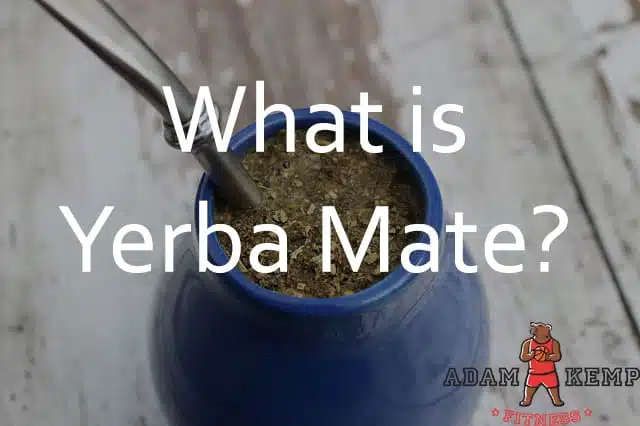
Yerba mate is a traditional South American herbal tea made from the dried leaves of Ilex paraguariensis, an evergreen holly plant native to subtropical regions of Argentina, Brazil, Paraguay, and Uruguay.
Known for its naturally occurring caffeine content, yerba mate provides a clean, sustained energy boost, often described as combining the strength of coffee, the smoothness of green tea, and the feel-good buzz of dark chocolate.
More than just a drink, yerba mate holds deep cultural significance in South America. It’s commonly shared from a hollowed gourd and sipped through a metal straw called a bombilla, symbolizing friendship, hospitality, and communal connection (Heck & De Mejia, 2007).
Yerba mate contains a caffeine concentration similar to that of coffee and tea, but its nutritional value is far more complex (Bracesco et al., 2011).
Along with caffeine, it delivers a wide range of bioactive compounds, including polyphenols, flavonoids, saponins, theobromine, and a variety of amino acids and trace minerals (Burris et al., 2012).
These nutrients support energy metabolism, immune function, and cellular protection.
While yerba mate is sometimes wild-harvested, it is most often cultivated on sustainable tea plantations.
It is typically processed as loose-leaf tea or in convenient tea bags, and can be steeped hot or cold.
The brewed tea has a greenish hue and a distinct earthy, grassy aroma.
Its taste is herbal and mildly bitter, comparable to green tea, but with more body and less astringency than black tea.
Referred to as “green gold” by early European colonizers, yerba mate has grown in global popularity thanks to its energizing effects and natural health benefits.
Whether you’re wondering what yerba mate tastes like, how much caffeine is in a cup, or if yerba mate is good for you, this guide will answer all your questions and help you decide whether yerba mate deserves a spot in your daily routine.
Yerba Mate Nutrition Facts
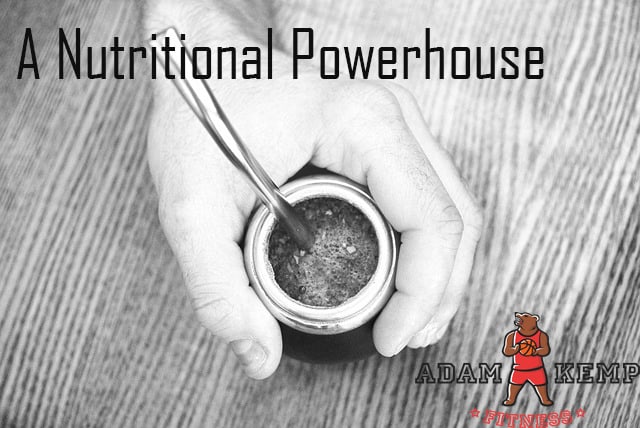
Yerba mate (Ilex paraguariensis) is a nutrient-rich herbal infusion native to South America, offering a unique combination of caffeine, antioxidants, and essential micronutrients.
Caffeine and Stimulants
An 8-ounce cup of yerba mate contains approximately 80 mg of caffeine, though this can vary based on preparation methods.
In addition to caffeine, yerba mate contains theobromine and theophylline, compounds that contribute to its stimulating effects.
Antioxidants and Polyphenols
Yerba mate is rich in polyphenols, including chlorogenic acid and caffeoyl derivatives, which have potent antioxidant properties.
In fact, studies have shown that yerba mate delivers higher antioxidant capacity than green tea (Bixby et al., 2005).
Vitamins and Minerals
While not a significant source of macronutrients, yerba mate provides small amounts of several vitamins and minerals:
- Vitamin C: Approximately 7.8 mg per cup, contributing to immune function .
- Magnesium: About 48 mg per cup, supporting muscle and nerve function .
- Zinc: Approximately 0.6 mg per cup, important for immune health .
These nutrients can contribute to overall health, especially when yerba mate is consumed as part of a balanced diet.
Saponins and Other Compounds
Yerba mate contains saponins, which have demonstrated anti-inflammatory and cholesterol-lowering properties.
Additionally, it includes trace amounts of amino acids and other phytochemicals that may support metabolic health.
Health Benefits of Yerba Mate Tea
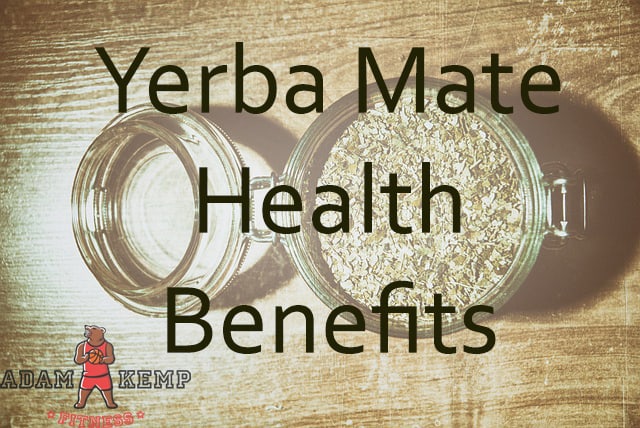
Yerba mate tea is more than just a natural energy drink, it’s a functional beverage packed with compounds that support your body from head to toe.
Thanks to its unique combination of caffeine, antioxidants, polyphenols, and saponins, yerba mate offers a wide range of science-backed benefits for physical performance, metabolism, immunity, and overall wellness.
Whether you’re curious if yerba mate is good for weight loss, heart health, or recovery after workouts, this section covers the most compelling reasons why health-conscious individuals are turning to yerba mate as part of their daily routine.
Boosts Energy Naturally
Yerba mate is one of the best alternatives to energy drinks and coffee for people seeking a clean, sustained boost without the crash associated with synthetic stimulants.
Each cup contains a moderate dose of caffeine, typically 80 mg, alongside theobromine and theophylline, two natural compounds that improve alertness, increase focus, and improve mood without overstimulating the nervous system.
Yerba mate’s energy-boosting properties make it one of the best teas for mornings or midday pick-me-ups.
Unlike many commercial energy drinks loaded with added sugars and artificial ingredients, yerba mate provides functional energy from plant-based sources.
This makes it a smarter option for athletes, students, and busy professionals who want to improve their mental and physical performance throughout the day.
Weight Loss
If you’re looking for a natural fat burner that can improve your workouts and curb your appetite, yerba mate is one of the best types of tea for weight loss.
Drinking yerba mate for weight loss has been supported by research showing its ability to increase fat oxidation and energy expenditure during exercise.
A 2014 study found that consuming yerba mate before physical activity improved fat burning and improved exercise performance by preserving glycogen stores, allowing you to train longer and more efficiently (Alkhatib, 2014).
Yerba mate may also help you recover from exercise faster, which is often overlooked when it comes to weight loss.
One study observed that individuals who consumed 600 ml of yerba mate after eccentric exercise experienced an 8.6% improvement in isometric strength recovery within the first 24 hours (Panza et al., 2016).
This accelerated recovery likely stems from yerba mate’s rich antioxidant and circulatory benefits, allowing you to get back to training faster with less soreness.
Another benefit? Yerba mate acts as a natural appetite suppressant (Yimam et al., 2016).
By helping reduce hunger and food cravings, it can make it easier to maintain a calorie deficit throughout the day, which is essential for sustainable fat loss.
From boosting fat metabolism to reducing post-workout fatigue, yerba mate offers a science-backed solution for anyone looking to lose weight and improve body composition naturally.
Contains Cancer-Fighting Compounds
Research suggests that yerba mate may offer promising anti-cancer properties due to its high concentration of bioactive plant compounds, including caffeoylquinic acid (CQA), polyphenols, and flavonoids.
A 2010 study published in the Journal of Functional Foods found that CQA derivatives extracted from yerba mate exhibited cytotoxic effects on human colon cancer cells (de Mejia et al., 2010).
These compounds triggered apoptosis, the natural process of programmed cell death, in a dose-dependent manner, highlighting yerba mate’s potential as a chemopreventive agent.
When researchers compared yerba mate to other antioxidant-rich teas like green and oolong tea, it actually demonstrated higher cytotoxic activity against human liver cancer cells (HepG2), reinforcing its strong antioxidant and anticancer profile.
Yerba mate also contains compounds similar to epigallocatechin gallate (EGCG), a known proteasome inhibitor found in green tea.
Proteasome inhibition is a significant target in cancer treatment, and yerba mate appears to act through similar pathways by disrupting cancer cell growth.
In addition, flavonoids such as quercetin and rutin, both found in small amounts in yerba mate, have been linked to anti-inflammatory and anticancer effects in cellular studies.
These compounds contribute to yerba mate’s overall chemopreventive potential by reducing oxidative stress and modulating cancer-related signaling pathways.
While more human trials are needed, the current evidence supports yerba mate’s role as a functional beverage with promising cancer-fighting compounds worth watching.
Better Heart Health
Yerba mate supports cardiovascular function through its unique blend of antioxidants, polyphenols, and natural stimulants.
Its anti-inflammatory properties help reduce oxidative stress, a key contributor to heart disease.
One of yerba mate’s primary compounds, theobromine, acts as a mild vasodilator, relaxing blood vessels and improving circulation.
This can support healthy blood pressure levels and reduce strain on the heart.
While traditional use includes managing symptoms like irregular heartbeat and low blood pressure, modern research suggests yerba mate may help improve endothelial function and reduce cardiovascular risk factors when consumed consistently as part of a healthy lifestyle.
Improved Digestion
Traditionally used as a natural digestive aid, yerba mate benefits gut health by easing symptoms of indigestion, constipation, and diarrhea.
Its mildly bitter compounds help stimulate bile flow and promote more efficient digestion.
Yerba mate also exhibits natural antibacterial activity, particularly against strains like E. coli, which are often responsible for foodborne illnesses.
In this way, it can help support gut microbiota balance and reduce the likelihood of stomach upset or gastrointestinal infections.
Additionally, yerba mate has been used to support kidney and urinary tract health—making it a useful ally in the prevention and treatment of UTIs, bladder infections, and even kidney stones.
Strengthens the Immune System
Yerba mate is rich in polyphenols and saponins, plant compounds that help modulate the immune response and reduce chronic inflammation.
Saponins, in particular, are known for improving immune cell activity and supporting the body’s natural defense mechanisms.
These bitter compounds also contribute to yerba mate’s signature flavor and are associated with benefits for cholesterol, bone health, and cellular protection.
Regular consumption of yerba mate increases your intake of powerful phytochemicals and antioxidants, which can fortify immune defenses and help the body respond more effectively to infections and stressors.
Cholesterol Support
Research indicates that yerba mate tea supports healthy cholesterol levels by improving serum lipid profiles.
This includes lowering LDL (“bad”) cholesterol while maintaining or even raising HDL (“good”) cholesterol.
Its polyphenolic compounds, especially chlorogenic acids and saponins, appear to inhibit cholesterol absorption in the intestines and improve lipid metabolism.
Over time, this may contribute to reduced cardiovascular risk and better long-term heart health.
Side Effects of Drinking Yerba Mate
Yerba mate tea is safe for most people when consumed in moderation. However, because it contains caffeine, it should not be consumed in excess quantities.
For those who are extremely caffeine sensitive, you should be more aware of how much you are drinking each day.
Yerba mate is great for a wake-up tea or mid-day boost, but I highly suggest you don’t drink it within a couple of hours of your bedtime.
Although yerba does contain a huge amount of health benefits, there are few side-effects to be aware of.
Some of the known side effects are:
- Sleep Trouble
- Nausea
- Upset stomach
- Increased heart rate and breathing
- Nervousness
- Headache
- Increased blood pressure
- Irregular heartbeat
Luckily, most of these side effects are mild and unlikely.
The easiest way to avoid most of these unwanted effects is to reduce your overall daily intake of caffeine.
The Best Yerba Mate Brands
With so many yerba mate products entering the market, finding a clean, high-quality option can feel overwhelming. Whether you’re brewing at home or reaching for a convenient energy drink alternative, the best yerba mate brands are organic, minimally processed, and rich in antioxidants—without artificial additives or heavy smoking.
What to Look for in a High-Quality Yerba Mate
- Organic and Non-GMO: Always choose certified organic to avoid pesticide contamination.
- Low-Smoke or Unsmoked: Avoid heavily smoked products, which may contain harmful compounds.
- Preservation of Nutrients: Brands that use flash-heating and low-temp drying retain more antioxidants, polyphenols, and nutrients.
Here are my top picks based on personal use and quality standards:
Top Pick: Guayaki Yerba Mate
Guayaki remains my favorite brand for everyday yerba mate.
They offer loose-leaf blends, tea bags, and convenient canned drinks, which are all USDA-certified organic and sustainably sourced.
Guayaki uses a flash-heating and low-temperature drying process that preserves antioxidants, caffeine, and other beneficial compounds in the leaves.
Whether you’re brewing a hot morning tea or grabbing a cold can before your workout, Guayaki offers some of the most consistent, high-quality yerba on the market.
Last update on 2025-04-18 / This article includes affiliate links/Images via Amazon Product Advertising API. I may earn commissions on purchases made through these links.
Best for Purists: EcoTeas Organic Yerba Mate
If you’re looking for a clean, traditional, unsmoked yerba mate, EcoTeas is an excellent choice.
Their Traditional Organic Mate is fair-trade, non-GMO, and air-dried, meaning no exposure to smoke or flame during processing.
This helps preserve a smoother flavor profile and may reduce exposure to PAHs (polycyclic aromatic hydrocarbons), which are sometimes found in smoked teas.
EcoTeas offers both tea bags and bulk loose-leaf options, making it easy to brew yerba mate your way, without needing a gourd or bombilla.
Last update on 2025-04-18 / This article includes affiliate links/Images via Amazon Product Advertising API. I may earn commissions on purchases made through these links.
Best Energy Drink Alternative: CLEAN Cause Yerba Mate
For a ready-to-drink option that delivers serious energy without sugar or artificial junk, I recommend CLEAN Cause Zero Calorie Yerba Mate (16oz cans).
Each can contains 160mg of caffeine, is keto-friendly, and uses organic yerba mate to provide clean, plant-based fuel.
With zero sugar and bold flavors, it’s one of the healthiest energy drinks available and perfect for busy days or pre-workout boosts.
Although Celsius energy drinks are my favorite, CLEAN Cause Yerba Mate drinks are one of the best Celsius alternatives due to their natural Yerba Mate content.
Even better, 50% of CLEAN Cause profits support addiction recovery initiatives, so every purchase makes a difference.
Last update on 2025-04-18 / This article includes affiliate links/Images via Amazon Product Advertising API. I may earn commissions on purchases made through these links.
Bonus Pick: Ahmad Tea Slim Natural Benefits Teabags
If you’re looking for a flavorful blend that combines yerba mate with other metabolism-boosting teas, the Ahmad Tea Green Tea, Lemon, Mate, & Matcha “Slim” is a great option.
This sugar-free, naturally caffeinated tea combines green tea, matcha, lemon balm, and yerba mate into one convenient and energizing blend.
Each teabag delivers a gentle caffeine lift and antioxidant support, making it a smart choice for weight management, digestive support, and clean energy.
It’s especially appealing if you want the benefits of mate without preparing loose-leaf tea.
Plus, the refreshing lemon-mint flavor profile makes it enjoyable hot or iced.
This is a great everyday option for anyone who prefers a convenient, ready-to-brew yerba mate tea that supports metabolism while keeping things light, clean, and flavorful.
Last update on 2025-04-18 / This article includes affiliate links/Images via Amazon Product Advertising API. I may earn commissions on purchases made through these links.
How to Brew Yerba Mate
Learning how to brew yerba mate is simple, whether you prefer traditional preparation or a quick and modern method.
The most important factor is using water at the right temperature and choosing high-quality yerba mate which is organic and minimally processed for the best flavor and health benefits.
Traditional Preparation (Gourd & Bombilla)
This is the classic South American method and a cultural ritual in countries like Argentina, Paraguay, and Uruguay.
What you’ll need:
- Dried yerba mate (loose-leaf)
- A cured gourd (mate)
- A bombilla (metal straw with a filter)
- Hot water (150°F–170°F or 65°C–77°C)
Steps:
- Fill the gourd ⅔ full with yerba mate.
- Tilt the gourd slightly so the yerba piles to one side.
- Insert the bombilla into the empty space.
- Pour hot (not boiling) water into the lower side.
- Sip slowly and refill with hot water as needed—mate can be steeped multiple times.
Simple Home Brewing (Without Special Equipment)
If you don’t have a gourd or bombilla, you can still enjoy yerba mate easily with tools you already have.
Option 1: Tea Bags
- Use 1 tea bag per 8 oz cup.
- Steep in hot (not boiling) water for 3–5 minutes.
- Sweeten with honey, stevia, or drink it plain.
Option 2: Loose-Leaf with a Tea Strainer or French Press
- Use 1–2 teaspoons of yerba mate per cup of water.
- Add to your tea strainer, infuser, or French press.
- Pour hot water (150°F–170°F) over the leaves.
- Steep for 3–5 minutes, strain, and enjoy.
Tips for Better Yerba Mate
- Flavor it naturally: Add lemon, mint, ginger, or natural sweeteners to enhance taste.
- Don’t boil the water: Boiling water scorches the leaves and makes the tea bitter.
- Experiment with strength: Use more or less yerba to adjust flavor and caffeine content.
- Try it iced or cold-brewed: Chill yerba mate after brewing or cold steep it overnight in the fridge.
Final Thoughts: Is Yerba Mate Good for You?
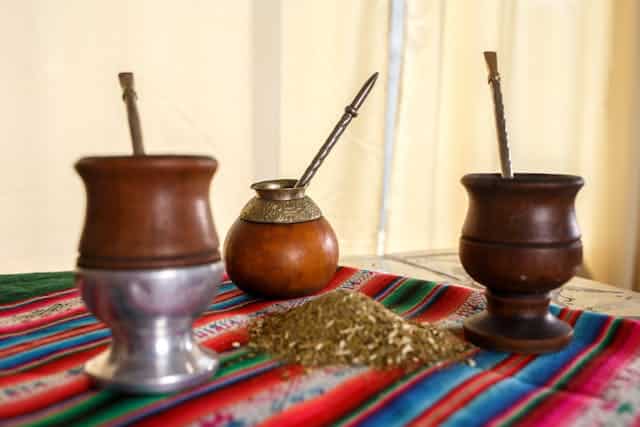
Yes, yerba mate is good for you when consumed in moderation and as part of a balanced lifestyle.
This traditional South American beverage offers a rare combination of energizing caffeine, powerful antioxidants, anti-inflammatory compounds, and essential micronutrients that support everything from metabolism to immune health.
As someone who has used yerba mate for years in both daily life and athletic performance, I can confidently say it’s one of the best natural energy drink alternatives available.
It supports fat burning, improves workout recovery, and delivers a clean mental boost without the crash of sugary commercial energy drinks.
While some concerns exist around overconsumption or smoked varieties, choosing organic, unsmoked yerba mate from trusted brands like Guayaki, EcoTeas, or CLEAN Cause can help you maximize benefits and minimize risk.
Whether you enjoy it hot in a traditional gourd, cold-brewed on the go, or in a convenient can, yerba mate offers a delicious and science-backed way to fuel your body and mind, naturally.
Frequently Asked Questions
Read Next: Benefits of Green Tea Before a Workout

